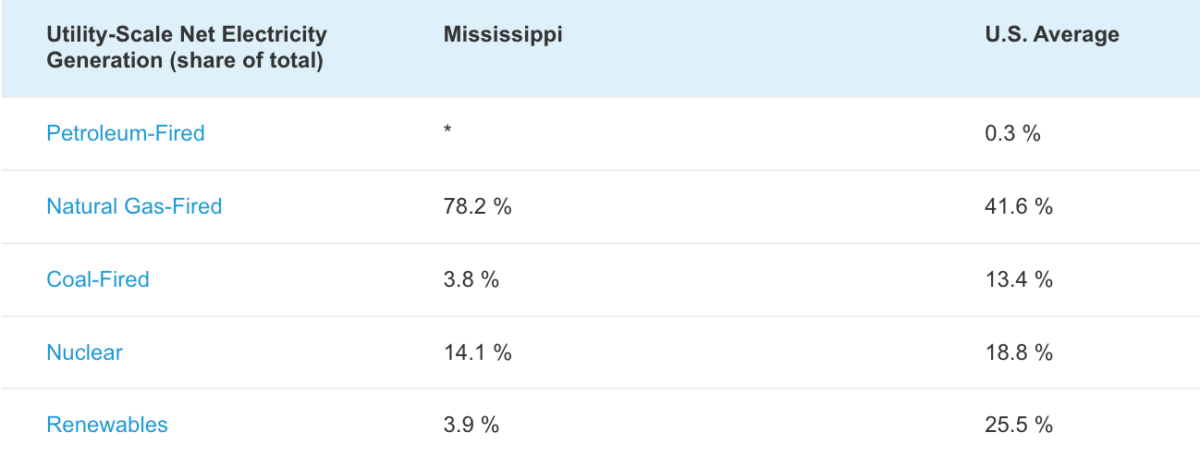Honest, paywall-free news is rare. Please support our boldly independent journalism with a donation of any size.
Kyle Wallace sat in the audience with his hand raised earlier this month so he could speak during an open discussion at the Mississippi Public Service Commission’s Solar Summit.
Wallace, an executive with the New Orleans-based rooftop solar developer, PosiGen, wanted to share information about solar energy with the relatively fresh-faced regulators. All three said earlier in the day they had many questions about how the renewable fuel would fit in in Mississippi, which still gets most of its electricity from fossil fuels.
But after another speaker, Brent Bailey, a former Republican Public Service Commissioner who advocated for clean energy and who now works for a local solar and energy efficiency company spoke, the commissioners cut off comments from that side of the room — abruptly ending the chance for any solar advocate or industry representative to speak.
“We want to hear from people who are not selling solar panels,” said De’Keither Stamps, a Democrat and a former state lawmaker who was elected to the commission last year.
Chairman Chris Brown backed him up.
“We’re turning into an infomercial,” said Brown, a Republican who also was elected to the three-member PSC last year after serving in the state House of Representatives.
Said Wallace: “We were sitting there in the audience thinking, ‘We have answers to these (questions); these are not new questions.’ We want to be able to address them, but we just weren’t provided the opportunity.”
In fact, the agenda for the Aug. 15 meeting included no one from the solar or clean energy industry. Serving in the role as an expert at the summit was a representative of the Texas Public Policy Foundation, a right-wing think tank funded by the oil and gas industry that is adept at spreading its anti-renewable agenda nationwide.
Keeping clean energy advocates out of the conversation is just one of a series of tactics the commission has used to discourage solar development in the Magnolia State. Earlier this year, the commission halted rules that would have made rooftop solar more affordable for homeowners and institutions including schools.
The Aug. 15 discussion comes at a time when climate change is approaching a tipping point, and the Biden Administration’s Inflation Reduction Act (IRA) has rolled out billions in tax breaks for clean energy to cut economy-wide carbon emissions 40% by 2030.
Lots of Sun — But Little Solar
Mississippi is the 13th sunniest state in the United States. But when it comes to solar, the state ranks 37 out of 50, according to the Solar Energy Industries Association, an industry trade group.
Mississippi’s neighbors in the South aren’t faring much better. Alabama ranks 32; Arkansas, 27; Louisiana is at 36, and Tennessee, 30. All figures are according to SEIA.

Wallace said the PSC staff member who was handing a microphone to audience members stopped walking toward where he and other environmental advocates were sitting. They all put their hands down.
He said members of the solar industry had been reaching out to the commissioners all year to help them understand the industry and the impacts of their policymaking on the future of solar in the state.
“It was disappointing,” Wallace said in an interview with Floodlight. “We had hoped that it would be more of an opportunity to have a dialogue and really engage. It obviously did not turn out that way.”
Policy Expert Is Fossil Fuel Lobbyist
Those invited to speak were executives from the politically influential Mississippi Power Co., the Tennessee Valley Authority, the state’s agriculture and commerce commissioner and Brent Bennett, a policy director from the conservative Texas Public Policy Foundation.
Bennett noted that most new power generation is coming from wind and solar. He said that correlates with higher electrical prices in California and Texas, where adoption of renewables has been higher than most states.
“For anyone that’s wanting to add more wind and solar to their resource mix, I think there’s a burden of proof there to show that, ‘OK, well, if you’re going to do that, how are you going to keep costs down?’ ” he said.
But pieces of that puzzle have been studied. A December 2023 report from the consulting firm Ernst & Young found the cost of producing and moving solar electricity over the life of the panels is roughly 29% lower than the cheapest fossil fuel.
Bennett’s track record for creating barriers to renewable energy can be seen in a sweeping energy law the Texas Legislature passed in 2023. According to the Guardian, Bennett edited several amendments to the bill, which doles out incentives for new plants that burn natural gas, also known as methane.
The edits included adding new transmission costs on renewables as well as a requirement that developers ensure wind and solar — intermittent sources of electricity — have access to backup power from fossil fuels, according to the Guardian.
Monika Gerhart, executive director of the Gulf States Renewable Energy Industries Association, said a lot of the information shared at the meeting “raised some real red flags.”
She added, “Everyone wants progress in innovation, and I’m not sure this summit was designed to meet those needs.”
Stamps said the meeting was a first step and wasn’t set up, “to solve all of the problems in one day.”
“It was just the start of the discussion, build some relationships, people can see people,” he said in an interview with Floodlight. “The anti people can come and be in the same room as the pro people … just put everybody in the same room together.”
When asked to respond to his comment regarding a desire to hear from people who weren’t selling solar panels, Stamps said that he’s allowed Bailey — his opponent in two previous PSC elections — and others from the industry to speak about solar on other occasions.
For this point in the meeting, “It was a question-and-answer period. It wasn’t a ‘give-your-speech’ period.”
Solar Faces Political Winds
Roughly 20 solar companies are based in Mississippi. The bulk of the solar installations there are in large — or so-called utility-scale — projects. Electric utilities prefer these projects for two reasons: they operate similar to existing power plants, and they can own them, which beefs up their bottom line.
On the flip side, these utilities are resistant — or even take steps to block — customers using rooftop solar because it is disruptive to the industry’s business model. The companies typically use an argument known as “cost shifting,” saying that rooftop solar customers depend less on the power grid, thus driving up the costs that others have to pay for that infrastructure.
Indeed, solar on homes and businesses in Mississippi barely shows up on a SEIA graphic of annual solar installations.
In 2015, the Mississippi PSC adopted a rooftop solar policy to make it more affordable for residents and small businesses. The rule was a top priority of then-veteran regulator Brandon Presley, a widely popular Democrat who ran unsuccessfully to unseat Republican Gov. Tate Reeves last year.
Presley, who also authored the PSC’s policy to boost energy efficiency, was behind a revamped rule in 2022 that offered rebates for home solar systems for low-income households as well as increased the amount they would receive for selling excess electricity back to the grid.
The new rule also created incentives for schools to install rooftop solar to decrease their annual energy expenses.
But the commission gutted that policy earlier this year, arguing that incentives through the IRA’s Solar for All program, administered by the U.S. Environmental Protection Agency, would make it easier for low-income residents to put solar on their roofs. The 2-1 vote happened without public notice or an opportunity to comment on the issue beforehand.
The Sierra Club, whose lobbyists are active in fighting anti-renewable energy policies at the PSC and at the Mississippi statehouse, sued the PSC in May, arguing the action should be rescinded because of the lack of notice.
During the summit, Gerhart was among the attendees who pointed out that regulators did not use the full hour-long time block allotted for discussion. The summit was running ahead of schedule, a rarity in any state utility regulatory meeting, so there could have been even more time to hear from members of the audience.
“So most of the industry folks who actually have valuable and factual information to share have sat here all day waiting for this public comment,” she told Floodlight. “They said that they didn’t want to hear from the industry, and then they shut it down.”
Press freedom is under attack
As Trump cracks down on political speech, independent media is increasingly necessary.
Truthout produces reporting you won’t see in the mainstream: journalism from the frontlines of global conflict, interviews with grassroots movement leaders, high-quality legal analysis and more.
Our work is possible thanks to reader support. Help Truthout catalyze change and social justice — make a tax-deductible monthly or one-time donation today.
